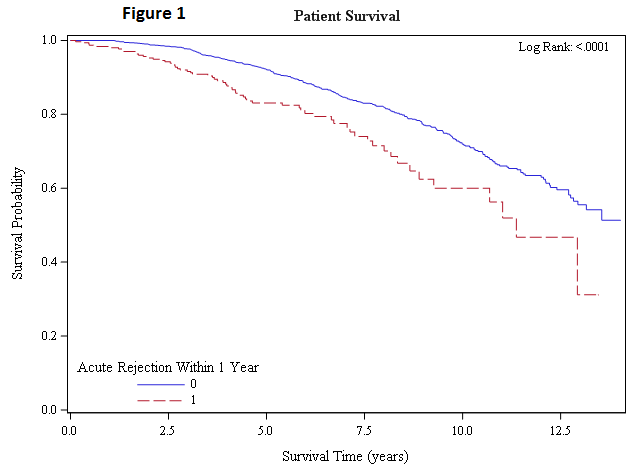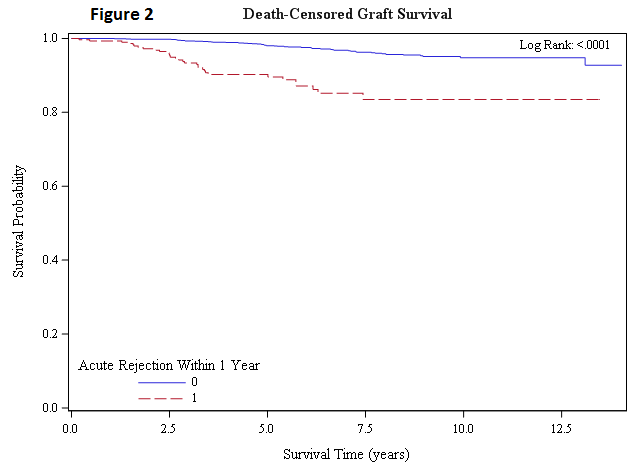11 Years Experience of Early Steroid Withdrawal Immunosupression Protocol in Kidney Allograft Recipient
Indiana University, Indianapolis, IN
Meeting: 2020 American Transplant Congress
Abstract number: B-108
Keywords: Glucocortocoids, Graft survival, Survival
Session Information
Session Name: Poster Session B: Kidney Immunosuppression: Novel Regimens and Drug Minimization
Session Type: Poster Session
Date: Saturday, May 30, 2020
Session Time: 3:15pm-4:00pm
 Presentation Time: 3:30pm-4:00pm
Presentation Time: 3:30pm-4:00pm
Location: Virtual
*Purpose: Early Steroid Withdrawal (ESW) Immunosuppression protocol has become a viable alternative to steroid based regimen. Our transplant program has adopted ESW protocol since 2003 and hereby present 11 years of our experience.
*Methods: A retrospective chart review of kidney transplant recipients at Indiana University Transplant between 2005 and 2016 was done. Patients with multi-organ transplant follow up time < 1 year, or primary kidney transplant failure was excluded from the analysis. All patients received anti-thymocyte globulin as well as pulse steroid induction regimen except for those with 0 antigen mismatch who received basiliximab induction. Patients were weaned off steroid by day 4 and chronically placed on 2 immunosuppression medication regimens.
*Results: 2097 patients were included in the final analysis with a mean follow up time of 6.4 years. Mean age at transplant was 51 years, 60.1% were recipients of deceased donor kidney, 21.8% were African Americans , 15.6% were repeat transplant, 10.3%% had cPRA > 50%, 8% had positive flow cytometry crossmatch, 74.2% were on dialysis before transplant with 45% having been on dialysis for > 3 years. 13.5% were steroid dependent at 1 year. Overall 1 Yr AR was 16.1%. 5 Yr survival probability for DCGS is 96.6% (95% CI: 96-97%) and for 5 yr patient survival is 89.2 %(95% CI: 88-91%). Compared to those without rejection at 1 Yr, those with 1 yr AR had significantly lower probability of DCGS (5 yr: 91% vs. 98) and patient survival (5 yr: 83.5 vs 91.9%, p<0.0001, Figures 1,2). Compared to recipients of living donor kidney, recipients of deceased donor kidney had significantly lower survival probability (5 years: 87.5% vs 91.5%, p<0.0001) but no significant difference in DCGS probability (p=0.1970). Subgroup analysis by ethnicity showed African Americans have significantly higher 1 Yr AR and lower survival probability for 5 Yr DCGS and Patient survival when compared to the Caucasian (p < 0.0001).
*Conclusions: Although, ESW immunosuppression protocol may be associated with slightly increased risk for 1 Yr. AR when compared to published data on steroid based regimen, our data overall shows DCGS and patient survival in the intermediate term highly favors ESW approach.
To cite this abstract in AMA style:
Adebiyi O, Sharfuddin A, Yaqub M, Mishler D, Taber T, Goggins W. 11 Years Experience of Early Steroid Withdrawal Immunosupression Protocol in Kidney Allograft Recipient [abstract]. Am J Transplant. 2020; 20 (suppl 3). https://atcmeetingabstracts.com/abstract/11-years-experience-of-early-steroid-withdrawal-immunosupression-protocol-in-kidney-allograft-recipient/. Accessed February 8, 2026.« Back to 2020 American Transplant Congress


